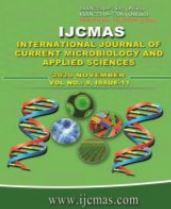


 National Academy of Agricultural Sciences (NAAS)
National Academy of Agricultural Sciences (NAAS)

|
PRINT ISSN : 2319-7692
Online ISSN : 2319-7706 Issues : 12 per year Publisher : Excellent Publishers Email : editorijcmas@gmail.com / submit@ijcmas.com Editor-in-chief: Dr.M.Prakash Index Copernicus ICV 2018: 95.39 NAAS RATING 2020: 5.38 |
The wastewater generated from sterilization, condensation and hydrocycloning of palm oil fruits during milling activities is referred to as Palm oil mill effluent (POME). It shows the presence of residue oil and suspended solids, due to its high biological oxygen demand (BOD), low pH and colloidal nature, its potentials to pollute both ecological niches have been attributed to the most intricate environmental turmoil for the 21st century. Currently, the penetration of palm oil mill effluents into the waterways and ecosystems has been considered a meticulous concern towards the food chain interference and water consumption. However, by the virtue of both anaerobic and aerobic biological treatment, some variety of microorganisms have been investigated to be capable of POME biodegradation, with the sole aim of providing a solution to environmental pollution problems, this is rapidly growing in recent decades where POME hydrocarbons and its derivatives are concerned. Organisms that have been successfully reported to be capable of degrading these hydrocarbons include Pseudomonas aeruginosa, Bacillus subtilis, Alcaligenes, Acinetobacter iwoffi, Flavobacterium sp., Aspergillus sp., and Rhizopus. Therefore, this article presents a characteristic review of POME pollution with new and emerging biodegradation potentials as a panacea to global issues plaguing our ecological niches, major limitations together with the future expectation are summarized and discussed.
 |
 |
 |
 |
 |